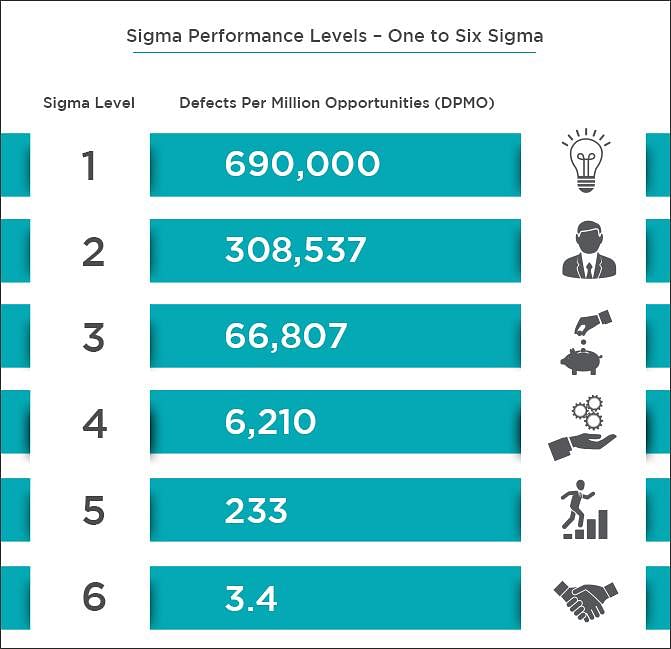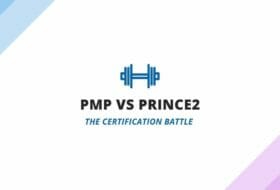Learning Six Sigma methodologies for your work life can help impact your career future. The ability to add Six Sigma Certification to your resume proves your commitment to improving your business acumen and analytical skills, as well as improving the business where you work. Famed the world over, the principles of Six Sigma find applications in countless organizations across a wide range of industries worldwide.
What Is The Six Sigma Certification?
Six Sigma is a carefully designed set of tools and techniques that help improve processes within an organization. The primary goal of the Six Sigma certification is to validate individuals who possess the skills to identify errors or defects in a business process and eliminate them.
The Six Sigma certification comes in various skill levels: Yellow Belt, Green Belt, Black Belt, and Master Black Belt. These certifications can be obtained through an accreditation body like the American Society for Quality (ASQ).
These certifications also help you become a specialist in process improvement and will enhance your career’s standard and credibility.
Is Six Sigma worth it? That’s not just adding another certification to your resume, there are many advantages that make Six Sigma certifications wonderfully useful.
1. Help Your Organization Eliminate Errors
From an organization’s perspective, acquiring a Six Sigma certification enables an individual to become crucial to an organization’s ability to identify and eliminate repeatable process errors.

With a Six Sigma certification, you would be able to transform and enable an organization to increase revenue by identifying and eliminating errors that would otherwise have brought poor customer satisfaction and losses to the business. Certified Six Sigma professionals can help reduce invoicing errors, customer complaints, complaint resolution time, spending, schedule delays, and cost overruns.
2. Improve Business Processes and Sustain Quality Improvement
Once you attain the Six Sigma certification, you’ll be able to prove you have the knowledge to identify the characteristics of an organization’s manufacturing and business processes and be able to measure, analyze, control, and improve them. You will also have the ability to conduct a complete review of current practices and gain a very clear understanding of their impact on quality performance.
You’ll also develop the ability to achieve the level of sustained quality improvement that organizations require—monitoring processes closely to ensure there is little to no deviation from the mean and taking corrective measures to reel in a project that may be straying from the path.
3. Applicability Across Industries
What is the value of a Six Sigma certification? As an industry-agnostic methodology, Six Sigma techniques are now applied in every segments: QUALITY – PRODUCT DEVELOPMENT – INNOVATION – ACCOUNTING – ADMIN- HR
With a Six Sigma certification, you will be able to position yourself as a change agent within the organization, spearheading quality improvement throughout your team or organization, bolstering your leadership skillset. Individuals certified in Six Sigma are knowledgeable in dozens of different methods to streamline business processes, improve employee acceptance, reduce costs, and increase revenue—all of which lead to a better bottom line, no matter the industry. As a professional, you need to adapt yourself to the changing demands of your industry. No matter what industry you are a part of, you need to learn to adapt your knowledge to different situations.
4. Ensure Compliance
With the stringent quality standards of Six Sigma, manufacturing and process errors are reduced to insignificant figures. This has meant that a number of vendors, procurers, and oversight organizations apply Six Sigma standards when evaluating products or accounts. As a certified Six Sigma professional, you will be able to help your organization comply with international standards, as well as maintain profitable contracts.
5. Helps Nurture Managerial And Leadership Ability
Six Sigma training also prepares you for leadership roles, with the techniques and knowhow to cut costs, increase revenue, and ways to improve the efficiency of the business process. Those who achieve Six Sigma Black Belt are not only educated on the methodologies of Six Sigma, they are also prepared to become a change agent within their organization, leading efforts to improve processes and the quality of products and services delivered to customers.
Once you complete your Six Sigma course and obtain your certification, you will have a clear understanding of measuring and quantifying financial benefits from executing any Six Sigma project. Because financial management and risk assessment are highly desirable skills for middle and top-level management, certified Six Sigma professionals stand a very good chance of rising to senior managerial positions.
6. Gain Hands-On Experience In Quality Management
Unlike a few other certifications, the Six Sigma certification process includes hands-on work on industry projects and experience with implementation of theoretical principles to real-life scenarios. As a certified Six Sigma professional, you will gain valuable experience even before you enter the workforce.
Ready to get started on the path to Six Sigma Master Black Belt? Simplilearn’s Lean Six Sigma master’s program is taught by Green and Black Belt certified professionals with more than ten years of industry experience in implementing Quality Management and will help you become a Lean Six Sigma champion.
Ready to get started on the path to Six Sigma ? Find out more on dedicated certified courses & programs.








